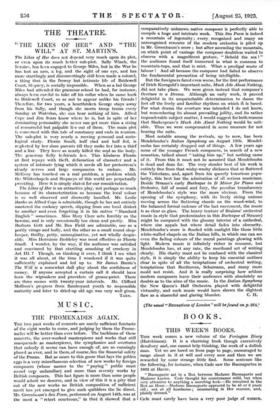MUSIC.
THE PROMENADES AGAIN.
THE two past weeks of concerts are surely sufficient foretaste of the eight weeks to come, and judging by them the Prome- nades will be better than ever before. The backbone of these concerts, the over-worked masterpieces and works that still masquerade as masterpieces, the symphonies and overtures that nobody it seems can have enough of, are as cunningly placed as ever, and in them,of course,lies the financial safety of the Proms. But as sauce to this goose that lays the golden eggs is a very miscellaneous selection of new works by foreign composers (whose names to the " paying " public must sound vecy unfamiliar) and more than seventy works by British composers. This last figure is more than some people would admit we deserve, and in view of this it is a pity that out of the new works no British composition of sufficient merit has yet emerged to give such quibblers the lie direct. 111r. Greenbaum's Sea Poem, performed on August 14th, was at the most a "retort courteous," in that it showed that a• comparatively unknown native composer is perfectly able to compile a huge and intricate work. This Sea Poem is indeed
• a mountain of Ingenuity; every, recognized and many an unrecognized resource of the modern orchestra is piled up in Mr. Greenbaum's score ; but after ascending the mountain, on which point of vantage the composer doubtless waited to observe with a magnificent gesture, "Behold the sea 1 " the audience found itself immersed in what is common to mountain-tops, and that is mist. What a prodigal waste of labour ! And all because the composer had failed to observe the fundamental precaution of being intelligible.
But the foreigners fared even worse, for the first performance of Erich Korngold's important suite, Much Ado About Nothing, did not take place. We were given instead that composer's Overture to a Drama. Although an early work, it proved delightful in its unquenchable determination to dance the feet off the lively and familiar rhythms on which i is based. For what drama the overture was intended I do not know, but remembering its almost prevailing jollity, and its rather imponderable subject matter, Lwould suggest for both reasons that Shakespeare's Much Ado About Nothing would be suit- able. Thus we were compensated in some measure for not hearing the suite.
Most notable among the revivals, up to now, has been Mendelssolui's Italian Symphony on August 15th. Mendel- ssohn has certainly dropped out of things. A few years ago some of the younger French composers, in search of a new sensation, talked about "taking him up," but nothing came of it. From this it must not be assumed that Mendelssohn is dead and done for. The very slender best of his work is entirely free from that wishy-washy slickness that so fluttered the Victorians, and, apart from his queerly tenacious popu- larity, this best has the admiration of all serious musicians. Beside Strauss's early Burlesque in D Minor for Piano and Orchestra, full of sound and fury, the peculiar translucency of Mendelssolm's style was the more obVious. From the opening of the symphony, with its. lively string unisons moving across the fluttering chards on the wood-wind, to the balanced formal cadence of the last movement, the music is as clear as glass. The heavy texture of Brahms' orchestral music (a style that predominates in this Burlesque of Strauss) might be compared with the gloomy interior of a cathedral, where size appals but where detail fades into obscurity. Mendelssolm's score is flooded with sunlight like those little white-walled chapels on the Italian hills, in which one can see even the fading colours of the mural paintings glowing with light. Modern music is infinitely richer in resource, but Mendelssohn has, at any rate, the moribund art of writing clearly. His clarity must not be confused with the classical style, it is simply the ability to keep his essential outlines clear in spite of all the temptations of orchestral writing, temptations that Beethoven, Schumann, and many more could not resist. And it is really surprising how seldom modern composers leave their audiences with absolutely no doubts as to the aims of the music. In the Italian Symphony the New Queen's Hall Orchestra played with delightful virtuosity, and such music would have shown the slightest
flaw as a 'shameful and glaring blunder. C. H.


































 Previous page
Previous page